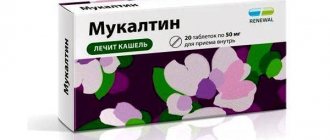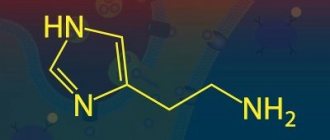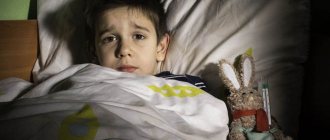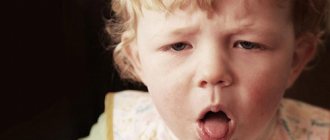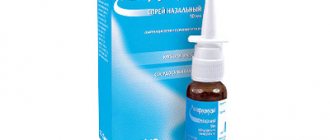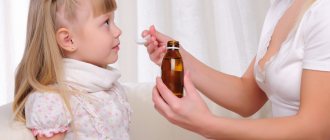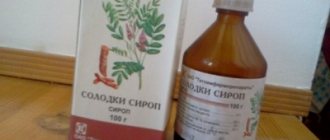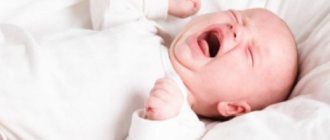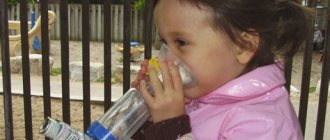Which cough syrup is best for children over one year old? If your baby is coughing and can’t sleep, if you look like a zombie after a sleepless night, then this is the place for you! The article will discuss the most effective and safe syrups for any type of cough.
- Dr. Theiss
- Fluditek
Why is it important to know the types of coughs in children?
There are quite a lot of types of cough in children under 1 year of age, and other age groups. The most important task of parents is to correctly determine the type of cough in order to choose the most effective remedy to get rid of it.
According to the degree of sputum discharge, they are distinguished
- Dry. The second name is non-productive cough . It is characterized by harshness of breathing, the presence of inflammatory processes in the respiratory tract, and their swelling. The mucus does not clear on its own, causing prolonged bouts of coughing.
- Wet. The second name is productive cough . In this case, sputum is either completely absent or present in small quantities. The cough becomes wet after a non-productive one, when treatment has already been used to expel sputum.
By duration of treatment
- A sudden cough most often occurs when a foreign body enters the body.
- A cough that lasts two months is called a persistent cough..
- Chronic cough occurs during exacerbation of a chronic disease and lasts more than two months.
- A recurrent cough occurs periodically and indicates the occurrence of an inflammatory process in the respiratory system of the body.
According to the presence of inflammation
- Barking . Indicates the presence of inflammation in the glottis. If measures to localize it are not taken in time, the child may experience suffocation or swelling of the larynx.
- Paroxysmal . This cough indicates that the child has whooping cough. This type of cough also occurs due to allergic reactions.
- A wheezing cough is a sign of asthma or chronic obstructive pulmonary disease, in other words, acute bronchitis.
What cough syrups are suitable for children from birth?
All materials on the site are published under the authorship or editorship of medical professionals, but are not a prescription for treatment.
Contact the specialists! Bronchial spasm is a reflex reaction of the human body to irritants entering the respiratory system. This action cleanses the upper and lower respiratory tract. Young patients are given certain medications during this symptom. Cough syrup for children under 1 year of age is the most effective medicine at a young age.
The list of medications of this type is quite long. Self-medication in infancy is unacceptable. Only a pediatrician should prescribe syrups. Any drug has contraindications and is dangerous in large dosages. Children's medicines are given depending on age or weight. The attending physician will help you write down the prescription in detail to get rid of the negative consequences.
Child 2-12 months: causes of cough
Infancy is difficult because it is necessary to select the correct therapy for the disease. Mortality from the wrong choice of treatment ranks fifth after heart disease. Negligent attitude of parents during bronchospasm in children 3 months and older leads to pneumonia, chronic pneumonia and decreased immunity.
Cough syrups are prescribed for infants. Before prescribing, it is necessary to establish an accurate diagnosis. The main causes of bronchospasm in children under one year of age:
- Inflammation of the upper respiratory tract - the disease is characterized by dry, debilitating spasm.
- ARVI accounts for 90% of cases in the pediatrician's office. During the day the spasm is mild, but at night it intensifies.
- Excessively dry air in the baby's room - cough syrup for children under 1 year of age will not help in this case. It is necessary to normalize the humidity; if it is not possible to purchase a humidifier, then you should periodically place a wet cloth on the battery.
- Inflammation of the middle ear or otitis media - bronchospasm occurs due to the fact that the child cries all the time in pain. Parents mistakenly make a diagnosis, triggering an inflammatory process in the ear area.
- The entry of a foreign body is a situation that requires an immediate response. The child's head must be tilted forward and an ambulance must be called immediately.
A cold causes dry bronchospasm, which after 2-3 days turns into a cough with sputum. This is a normal reaction of the body to bacteria that have entered the baby’s body. A cough syrup or mixture is prescribed to a baby for cough, it all depends on the type of disease.
Cough remedies: benefits of syrups
Some medicines are prescribed to children from birth. After diagnosis, the pediatrician issues a prescription with medications and method of administration. Some parents don’t like the fact that liquid medications cost 2-3 times more than tablets. In fact, the price is justified.
Cough syrups for children under one year old have a number of advantages:
- measuring spoons and cups will not allow you to make mistakes with the dosage;
- The child drinks the liquid medication easily;
- there is no danger that the medicine will get stuck in the respiratory tract and the child will choke;
- kids like the pleasant taste;
- minimum side effects, slings are made using plantain, licorice and other medicinal herbs.
Cough therapy for children under one year of age should be carried out under the supervision of a physician. If the doctor insists on inpatient treatment, there is no need to resist.
Contraindications and dangers
Cough syrup for newborns is made based on natural ingredients, this does not mean that you don’t have to think about contraindications:
- allergic reaction (individual intolerance to components);
- diabetes;
- fructose intolerance - it is added to give the medicine a pleasant taste;
- gastrointestinal diseases;
- age of the patient - the instructions for the medication always indicate the permissible age period when syrup can be given.
Liquid medications are often purchased for an infant's cough. Parents are confident that these pharmaceutical products are not harmful. Practice shows that each baby is individual, so medications must be given carefully in the indicated dosages.
It is dangerous to continue therapy when the baby has a rash or drowsiness. If there is no result, the syrup is also stopped. Contacting the clinic immediately will help you avoid trouble.
Cough medications prohibited in infancy
Acetylcysteine and carbocysteine in the composition of the drug are a reason to refuse therapy. These components are prohibited for a person at a young age. Parents should be vigilant when reading pediatrician's prescriptions; unfortunately, medical errors are not uncommon in practice.
The following syrups should not be given to an infant for cough:
- Mucomist - sold in the form of granules, from which medicines are prepared. It can be used from the age of two, but not earlier;
- Mucodin - the instructions indicate that this drug can be used to treat bronchospasm in children from one month of age. In Europe, the drug is considered dangerous for a small organism; the syrup can only be used at 2.5 years of age;
- Fluditec is a mucolytic drug; the annotation says that the medication can be taken from two years of age.
What can you give a child with severe bronchospasm? This question is asked by many parents who want to save their baby from a debilitating cough. Pharmaceutical companies offer a number of syrups that can be used from 6 months and even for younger children.
Ambrobene for newborns
For infants, medications are chosen carefully. The pediatrician prescribes Ambrobene if the baby suffers from a debilitating dry cough. Severe spasm interferes with sleep and eating. The main advantage of the drug is the absence of side effects if the dosage is strictly followed.
A cough suppressant for children is prescribed during the following diagnosis:
- bronchial asthma;
- bronchitis;
- acute stage of pneumonia;
- respiratory inflammation.
The mucolytic expectorant has a safe composition: hydrochloric acid, purified water, ambroxol hydrochloride and potassium sorbate. The dosage of syrup up to two years of age should not exceed 2.5 ml per dose, no more than 2 times a day.
Source: https://kokch.ru/kakie-siropy-ot-kashlja-mozhno-detjam-s-rozhdenija/
Why is syrup more effective?
Why doctors are inclined to use syrups in the treatment of cough, especially in children. It's simple. Cough syrup for children over one year of age is the most effective expectorant today.
The effect comes much faster than when taking pills.
To do this, you can conduct a simple visual experiment. Take a sponge or washcloth and moisten it with water. Next, put the tablet on it and pour a little syrup. The time taken to dissolve the tablet will reach 30 minutes.
At the same time, the syrup will be absorbed in just a few seconds. It's the same with our lungs. The liquid is absorbed by the body faster than the solid substance, so the treatment effect occurs 5 times faster.
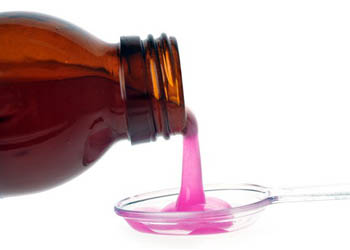
Treatment with syrup is much easier than giving pills to a small child
Another compelling argument in favor of cough syrup for children under one year of age. It is much more convenient to give to a child than other dosage forms. Not every baby will be able to swallow a pill.
Almost all syrups have a sweet taste that children like.
Each package contains a measuring spoon or syringe that can be used to easily measure the dose of medication . In most cases, tablets still need to be divided, since they are rarely available in children's doses.
In addition to the above, a greater number of components can be effectively combined in syrup than in tablets.
Cough syrups for newborns
Due to the immaturity of the immune system, young children are susceptible to various types of infectious diseases, including symptoms such as coughing. At the same time, parents often fall into real panic, not knowing which medications are suitable to save their child from the disease.
The choice is also complicated by the fact that the respiratory muscles in infants are still too weak, due to which the process of coughing up sputum is much worse than in adults. Which cough syrup to choose for infants and what should you pay special attention to when purchasing the product? You will find answers to these questions in this article.
Remember: the recommendations given below are for informational purposes only, and only a doctor can prescribe the drug.
For what reasons can a child have a cough?
A cough, which is a reflex response of the respiratory system to various irritants, can appear in an infant for a number of reasons. The function of cough is to clear the airways. Cough is provoked by inflammatory processes, increased levels of air pollution, dust and smoke entering the respiratory tract, allergic reactions and other negative factors.
First of all, it is important to understand exactly what reasons led to the fact that the infant began to cough
Pediatricians say that most often cough is provoked by the following factors:
- respiratory viral diseases. It is ARVI that causes cough in infants in 90% of cases. In this case, the cough weakens in the morning and during the day and significantly intensifies at night, which is associated with the structural features of the respiratory system: at night, when a sleeping child is in one position for a long time, sputum flows down the back wall of the neck, irritating it and causing a reflex act of coughing. Also, with ARVI, the child’s temperature rises and symptoms such as general weakness, drowsiness, decreased appetite are observed, the baby becomes capricious and cries a lot;
- inflammatory processes in the upper respiratory tract. The cough is unproductive, that is, the phlegm does not come out. At the same time, the cough is intrusive and greatly tires the child;
- entry of a foreign body into the respiratory tract. The cough occurs suddenly and is accompanied by redness of the skin, intermittent wheezing and even convulsions caused by a lack of oxygen. The foreign body should be removed as quickly as possible, otherwise the child may suffocate;
- inflammation of the middle ear. With this pathology, coughing occurs reflexively due to irritation of certain nerves. Only a doctor can identify inflammation of the middle ear, but there is a symptom that parents can check for. With inflammation of the middle ear, light pressure on the tragus (the cartilage on the outside of the ear near the auditory opening) causes the child to become restless and begin to cry.
Environmental factors can also lead to coughing. For example, if someone constantly smokes next to a child, the smoke will irritate the airways, causing a dry cough. In rare cases, coughing accompanies teething.
By the way, psychologists say that a baby can cough in order to attract attention.
For example, after suffering from an acute respiratory viral infection and realizing that a cough makes mom and dad run to his crib, a child may cough slightly when he becomes bored or lonely.
A child's coughing condition can vary widely.
For example, in mild cases, coughing practically does not cause discomfort, but in severe cases, the cough is accompanied by vomiting, cramps and pain in the sternum.
If your baby is breastfed, a cough may prevent you from drinking enough milk. In addition, the baby may cough during feeding and choke, which is extremely dangerous.
It is very important to quickly diagnose the child correctly in order to begin treatment in a timely manner.
How do cough medications work?
Manufacturers produce a variety of cough syrups that have different mechanisms of action and contain different active ingredients. There are three main groups of drugs:
- antitussive syrups. As the name implies, such remedies are aimed at combating cough directly. Antitussive syrups, acting on the nerve centers, alleviate the baby’s condition if he has a dry, prolonged cough, but they do not treat the inflammation itself;
- mucolytic agents. Sometimes, for one reason or another, a productive cough does not clear the bronchi, as a result of which the disease drags on for a very long period. This can happen if the sputum is too thick and sticky. Mucolytics help thin mucus and allow it to leave the baby's body. Typically, mucolytic syrups are prescribed together with expectorants;
- expectorant syrups. This group of drugs is needed to facilitate the process of sputum release. Typically, such syrups contain extracts of medicinal plants, for example, licorice root. Unfortunately, the natural composition does not always mean the drug is harmless: plant extracts often cause allergic reactions in infants, so such drugs must be used with great caution.
As a rule, modern drugs include components that simultaneously dilute mucus, promote its removal and alleviate the symptoms of the disease. However, taking such combined drugs is not always necessary.
Under no circumstances should you select medications yourself.
Despite the fact that most syrups are sold without a prescription, you should consult a doctor before giving the product to a small child.
For example, mucolytic drugs taken without combination with expectorants can lead to the accumulation of sputum in the lungs, which causes the development of severe pneumonia.
The syrup can only be taken by an infant under the supervision of a physician.
Recommendations for choosing drugs
There are general recommendations regarding the choice of cough syrups for little ones:
- for a prolonged dry cough that is not accompanied by sputum production, preference should be given to antitussive drugs that suppress the cough reflex and bring relief to infants;
- It is often necessary to use several drugs simultaneously to treat a child. For example, if a cough is caused by an allergic reaction, the use of anti-allergy medications is required, which are not always combined with cough suppressants. The choice of medications and their combinations is a task for the doctor! Under no circumstances should you follow the advice of “experienced” mothers and dubious forums on the Internet;
- you can buy your baby both single- and multi-component syrup: the choice depends on the reasons that caused the cough;
- if the baby is prone to frequent allergies, it is better to abandon the syrup and resort to other means of treatment. Syrup can provoke diathesis, as a result of which the baby’s condition will not improve, but, on the contrary, will become even more severe;
- Allergic reactions are least likely to occur to syrups containing licorice and plantain root;
- If an infant suffers from diseases of the gastrointestinal tract, it is better to avoid taking syrups.
Syrup for dry cough: what to do if sputum does not come out?
A dry cough with ARVI can last quite a long time. In order for the disease to go away as quickly as possible, you need to help the child cough up the mucus accumulated in the bronchi. If this is not done, ARVI can develop into pneumonia, which threatens the child’s life and requires long and difficult treatment.
For dry coughs, syrups containing plantain and mint are best. Plantain has an active antiseptic effect and also activates bronchial contractions, while simultaneously reducing the thickness of sputum. In addition, plantain rarely causes allergic reactions.
Syrup for infants can also be made at home. To prepare it, you need to mix a small amount of sugar syrup with carrot juice in a two to one ratio.
Before using a home remedy, you should consult your pediatrician
Wet cough syrup
Parents should contact their pediatrician for any, even the most minor, manifestations of ARVI in newborns. After all, without proper treatment, the disease can quickly develop dangerous complications, including those affecting the brain or heart.
If, during ARVI, a child has a strong cough without sputum discharge, he must be prescribed expectorants and mucolytics. In addition, you should not limit the child’s mobility: active movements will help cleanse the respiratory tract and bronchi.
By the way, for a dry cough that accompanies ARVI, you can give your child not cough syrup for newborns, but tablets called mucoltin. Despite the fact that this remedy is recommended for older children and adults, it also has an excellent effect on infants.
True, in no case should you give a child under one year more than two tablets per day. In addition, the tablets should be given after dissolving them in a teaspoon of water. Mucoltin contains marshmallow extract, a medicinal plant that can cause an allergic reaction in a baby.
Therefore, for the first time you need to give the child a quarter of the tablet and carefully monitor his reaction for at least a day.
The most effective remedies for infants
The most effective drugs for relieving cough in infants include:
We recommend reading: Cough in an infant without fever
- "Ambroxol". This cough syrup for infants effectively thins mucus and removes it from the bronchi. The syrup has a fairly pleasant taste, so there are usually no problems with getting the child to swallow the medicine. Ambroxol can be prescribed to children from the first month of life.
- “Lazolvan.” This drug has a good effect on long, wet coughs. The drug accelerates the cleansing of the lungs and quickly alleviates the condition of an infant suffering from ARVI.
- “Bronchicum.” This medicine is prescribed exclusively to babies who have reached the age of six months. “Bronchicum” relieves unproductive cough and also actively thins viscous sputum.
- "Ambrobene". The product has a combined effect: it simultaneously thins mucus and promotes its rapid removal from the lungs.
- “Bromhexine.” This medicine comes in two forms. Syrup is recommended for children under six months of age; older children are usually prescribed medication in tablet form.
- “Eucabalus.” Syrup based on the medicinal herb thyme. It has a combined effect: it suppresses coccal microflora and pathogenic bacteria, and also stimulates expectoration of sputum. Prescribed to children from 6 months of age.
- “Stoptussin.” It calms cough well, affecting the nerve endings of the bronchi, which alleviates the patient’s condition. It has an antispasmodic effect, due to which it removes mucus from the respiratory tract. It is especially effective in cases of prolonged dry cough.
Syrups for children against wet cough
Consider the most effective syrups for productive coughs in children.
Dr. Theiss
This cough syrup is of plant origin only. It includes plantain, mint, beets. Improves sputum discharge, both in the lungs and in the upper respiratory tract. Should not be taken simultaneously with medications for dry cough . Dr. Theiss is a remedy only for productive coughs.
- Children are prescribed from one year of age.
- Take 2.5 ml 4 times a day. The syrup should be washed down with warm water.
overslept
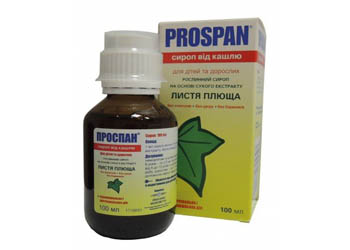
This syrup consists of ivy extract , i.e. also of plant origin.
Therefore, Prospan is a cough syrup specifically for young children.
Ivy has mucolytic, expectorant, antispasmodic, antimicrobial and antitussive effects.
Prospan removes difficult-to-separate viscous sputum from the body.
One minus is that skin rashes in the form of urticaria, itching are possible, because... ivy is a plant to which children are very often allergic.
- Prescribed to children from 1 year.
- Take 3 times a day, 5 ml.
Bronchicum
Bronchicum is a herbal cough syrup based on thyme. Minus – contains ethyl alcohol. Age limit – up to 2 years. It is used as an expectorant for inflammation of the upper respiratory tract, which is accompanied by a cough with thick, difficult to separate sputum.
It is also not recommended to take it together with antitussives.
- Take 1 teaspoon 3 times a day.
- The course of admission is 14 days.
Herbion primrose syrup
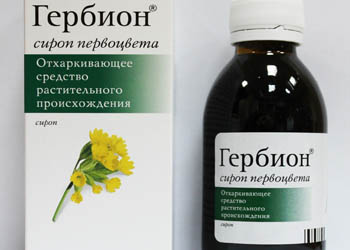
Unlike Herbion with plantain, primrose syrup should be used for a productive cough.
It has an expectorant effect and is a herbal preparation.
Does not contain alcohol. The downside is that it is very sweet and cloying . Children drink it reluctantly and often refuse to take it
Gerbion syrup with primrose is prescribed for cough for children only from 2 years of age.
- Take 3 times a day, 0.5 teaspoon.
- Course – 2-3 weeks.
Ambrobene
Ambrobene is a children's wet cough syrup. The main composition of Ambrobene syrup is ambroxol. The only product on the market that does not contain preservatives or thickeners. Therefore it is allowed for infants . It has an expectorant and mucolytic effect.
- Ambrobene (syrup for children) is prescribed 2.5 ml (0.5 tsp) 2-3 times a day.
- The course of treatment is 7 days.
An undoubted advantage is that Ambrobene is available in the form of syrup for inhalation. It is convenient to use for older children.
Which syrup should you choose?
When buying cough syrup for children, pay attention to age restrictions. To determine which syrup is the best and safest, parents can use the following list:
Up to a year
- Gedelix is a good expectorant medicine for the treatment of wet cough in patients under 12 months of age. The medicine can be given to newborns, but in this case strict medical supervision is necessary. The drug is made on the basis of ivy extract, which is very effective in removing even the most viscous mucus.
- “Prospan” is used to treat both wet and dry cough in patients older than three months. The main component of the product is dry ivy extract. It has secretolytic, mucolytic and antispasmodic effects.
- "Equabala" is a drug that effectively suppresses inflammatory processes, so it can be used to treat bronchitis and pneumonia. It is not recommended to give Equabala to infants under 7 months.
- "Lazolvan" - this children's cough syrup can be given to both a newborn child and older patients with bronchitis, pneumonia, accompanied by poor mucus secretion.
From one to two years
- "Pertusin" is an expectorant, antitussive and mucolytic drug of a combined type. Made from thyme extract and potassium bromide. "Pertusin" is considered one of the best medicines for the treatment of dry cough with bronchitis, pneumonia, laryngitis, influenza, etc. It is not recommended to use this drug during breastfeeding and in patients with allergic reactions to its components.
- "Doctor Theis" - a product made on the basis of plantain extract, can be given to a child over one year old with a wet cough. Has expectorant and anti-inflammatory effects.
- "Glycodin" - indicated for dry barking cough, has a peripheral anti-inflammatory effect.
Two to three years
- "Broncholitin" - has a peripheral bronchodilator effect, belongs to the group of drugs of a combined type. Can be given to a child over three years of age for bronchitis, pneumonia and whooping cough. Contraindicated in breastfeeding and allergic reactions to the components of the drug.
- "Codelac Neo" - this cough syrup is prescribed to children suffering from a dry barking cough, whooping cough, accompanied by difficult to separate viscous mucus. Does not contain narcotic substances.
- "Omnitus" - children's cough syrup has a central non-narcotic effect. Indicated for dry barking cough.
Cough syrup of any spectrum is prescribed to newborn children only in exceptional cases.
Syrups for children against dry cough
Fluditek
Fluditec - syrup for children against dry cough. Effective for bronchial asthma, tracheitis, bronchitis, pneumonia. The main active ingredient in Fluditec cough syrup is carbocisteine. It has a mucolytic and expectorant effect.
- Take 5 ml 2 times a day.
- The course of admission is 3 days.
The downside is the rather high price.
Bromhexine
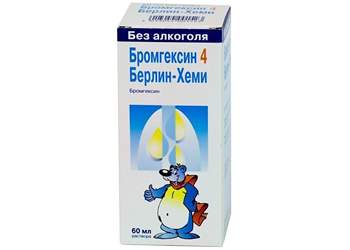
This syrup for children has no age limit and can be used in children under 1 year of age.
The active substance is bromhexine hydrochloride. It has a mucolytic and expectorant effect.
Bromhexine children's syrup helps liquefy and remove mucus.
For children there is a separately produced form of the drug - Bromhexine Berlin Hemi syrup for children. It has a pleasant taste that kids really like.
Bromhexine syrup for children is a remedy for unproductive, painful cough. It is prescribed for tracheitis, bronchial asthma, cystic fibrosis, tuberculosis.
- from 0-2 years, take 2.5 ml 3 times a day;
- from 2 to 6 years – 5 ml 3 times a day.
- Course – 6 days.
It is advisable to consume a significant amount of liquid when taking it to achieve the best treatment effect.
Dr. MOM
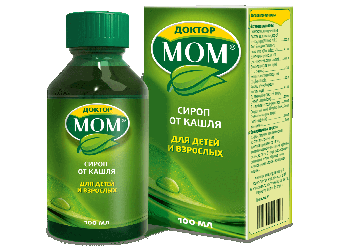
This cough syrup for children also contains herbal ingredients that help eliminate dry cough.
Aloe, elecampane, ginger, wasaka, nightshade, licorice, cubeba pepper are the main plant components of the syrup.
Doctor IOM syrup for children has bronchodilator, expectorant, anti-inflammatory and mucolytic effects. Relieves acute attacks of dry cough. Recommended for children from three years of age .
- Take 0.5 teaspoon 3 times a day.
- Duration of treatment – 14 days.
Herbion plantain syrup
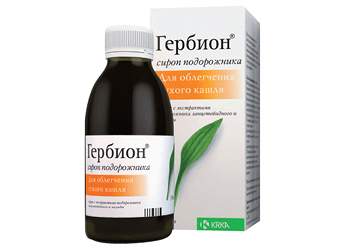
Gerbion syrup is prescribed for dry cough. Has a mild effect on the inflammatory process in the lungs.
It envelops the affected areas, removing phlegm from there.
The main distinguishing feature is the gentle elimination of dry cough . Syrup of plant origin. Contains a small amount of alcohol. Recommended for children from two years old.
- Give 3 times a day.
- Course – 7 days.
What are the signs that a child has an allergic cough? How to distinguish it from infectious. You will learn about this and more from the article.
Treatment of obstructive bronchitis in children is described in this article. Its differences from ordinary bronchitis are also described.
Sinekod
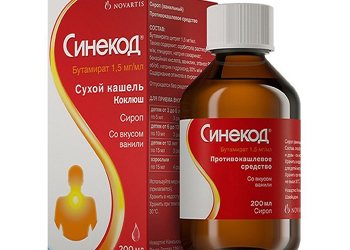
Sinecode for children - a medicine against dry cough.
It has a central effect on the source of inflammation, reducing cough. Relieves attacks
suffocating cough and makes breathing easier.
Does not include plant components . It is a synthetic drug containing a bronchodilator - butamirate.
Used for whooping cough, bronchitis, tracheitis. Probably, Sinekod is the most effective children's syrup for dry cough, but the price is not as reasonable as that of other drugs.
Analogues of Sinecode, which will cost much less
- Codelac NEO;
- Bronchoton;
- Broncholine sage;
- Bronholitin.
Sinekod for cough is prescribed to children from three years of age no more than three times a day. It also comes in drops and dragees.
- Drops can also be prescribed to infants aged 2 months and older. Dragee - from 6 years.
- The course of treatment is 7 days.
Glycodin
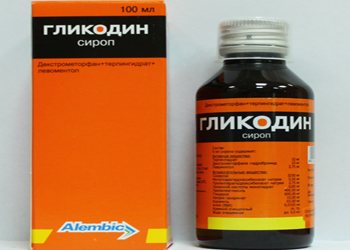
This syrup is used in the treatment of acute diseases of the respiratory system.
Glycodin improves sputum discharge and relieves dry cough. Effective for painful paroxysmal cough.
Glycodin syrup contains the following synthetic substances: dextromethorphan, terpin hydrate and levomenthol.
Contraindicated for bronchial asthma and children under 1 year of age. Minus - the syrup can cause overexcitement in the child.
- The course of treatment is 4 days.
- Take 2 times a day.
Bronholitin
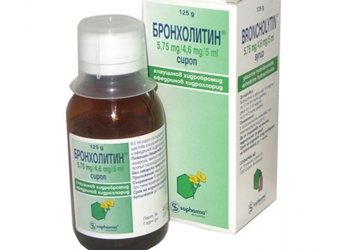
Broncholitin cough syrup is similar in action to Bromhexine. The active substance is glaucine hydrobromide and ephedrine hydrochloride.
It has a suppressive effect on the cough center, eliminating dry cough for up to 6 hours .
It also has anti-inflammatory and antiseptic properties. Age limit for children under 3 years old.
- Dosage: 5 ml of medication diluted in water 3 times a day.
- The course of admission is 5 days.
Most of all, parents worry about their children with a dry cough. Inhalation with a nebulizer for dry cough is another assistant in treatment.
We have taken care of the selection of effective cough inhalers and nebulizers in this article for you.
Cough compresses for children: here you will learn the pros and cons of this treatment method.
Comparative table of cough syrups for children over 1 year old.
| Name | Operating principle | Age, years | Contraindications/Side Effects | Dosage | price, rub. |
| PROSPAN | Improves the discharge of difficult to separate sputum | 0 | Component intolerance | 2.5 ml | 89 |
| BROCHOLITIN | Bronchodilator, expectorant | 3 | Glaucoma, heart disease | 5 ml | 100 |
| GLYCODINE | Antitussive | 1 | Intolerance to components, asthma | ¼ tsp. | 120 |
| AMBROBENE | Expectorant, mucolytic | 0 | Component intolerance | 2.5 ml | 129 |
| BROMHEXINE BERLIN CHEMIE | Dilution and separation of mucus | 0 | Kidney disease, liver disease, ulcer | 5 ml | 165 |
| DOCTOR MOM | Bronchodilator, expectorant, mucolytic | 2 | Increased sensitivity of components | 2.5 ml | 184 |
| GERBION | Expectorant, mucolytic | 2 | Ulcer, diabetes | ½ tsp. | 265 |
| FLUDITECH | Antitussive, mucolytic | 2 | Nausea, allergic reactions | 5 ml | 315 |
| BRONCHICUM | Mucolytic, expectorant | 2 | Fructose intolerance | 5 ml | 320 |
| DOCTOR THEISS | Expectorant | 1 | Component intolerance | ½ tsp. | 345 |
| SINECODE | Antitussive | 2 | Individual intolerance to components | 5 ml | 395 |
Effective cough tablets for children – Disease Guru
When a small child develops a piercing and prolonged cough, parents immediately begin to worry and look for ways to treat it.
The best way is to contact a pediatric therapist who will examine and listen to the child’s breasts and prescribe adequate treatment.
But there are very effective remedies that parents can use for children without a doctor’s prescription, including traditional methods of therapy that have been proven over centuries.
Methods for treating cough in a child
All drugs for the treatment of cough in children have a central or peripheral effect on the body. Drugs are selected depending on the stage of the disease, the age of the child and concomitant symptoms. Pharmacy products can be used that have a clear structure of use and dosage by age. All these nuances are prescribed in the instructions for use.
Proven traditional methods of treatment can also be used. Their effectiveness depends on the correct course of treatment, which also depends on the severity of the cough and its duration.
Anti-inflammatory drugs
In the pharmacy you can find a whole list of anti-inflammatory drugs that effectively treat cough in children. Among the most effective are:
- Gerbion. Using the drug on the first day after the onset of coughing attacks softens it by diluting the mucus produced. Should be used for children from 2 years of age.
- Ambroxol. Reduces the inflammatory process and improves the child’s overall well-being by increasing coughing and expectoration of sputum. This drug can cope with cough even in acute and chronic bronchitis.
- Bronchipret. A natural-based drug with the addition of synthetic components. Reduce inflammation by actively fighting pathogenic microorganisms. The medicine is used from 3 years of age.
Expectorants
Expectorants are designed to improve the removal of mucus from the bronchi, provided that the mucus is not very thick and viscous. Althea root extract copes with this task perfectly. Based on it, mucaltin tablets are made, which perfectly help overcome the accumulation of mucus and help its rapid removal from the bronchi.
Special cough tablets Thermopsol also have good expectorant properties. They reduce the viscosity of mucus and effectively remove it from the lungs.
Thermopsol is also effective when a child has untreated bronchitis or tracheitis, manifested by coughing without accompanying symptoms.
Mucolytics
Mucolytics are designed to thin sputum and thus speed up the recovery of the little patient. The main well-known mucolytic agents include the following:
- Vicks Active.
- Fluimucil.
- ACC.
- Solvin.
- Combined-action drugs Joset, Ascoril and Cashnol.
Antitussives
Antitussive drugs must be prescribed by your doctor, as they contain the serious substances butamirate and glaucine.
Medicines with a central effect on the body can be called Sinekod, Falimint, Stoptussin. Their peculiarity is that they are used only and exclusively for the treatment of dry cough.
When excreting macrota, expectorant therapeutic drugs should be purchased.
If your child's cough is too dry, it is necessary to purchase products based on prenoxdiazine. The most recommended drug among specialists is Libexin. It has a gentle effect on the mucous membrane, without aggravating the tickling process, and thereby softens it, helping to fight coughing attacks.
Bronchodilators
The principle of operation of bronchodilators is to expand the bronchial passage and improve breathing. Effectively used for diseases such as obstructive bronchitis and bronchial asthma.
Bronchodilators should be prescribed by the attending pulmonologist after a thorough examination of the body and the necessary diagnostic procedures.
The most effective are:
- Berodual.
- Salbutamol.
- Formoterol.
- Hexoprenaline.
- Eufillin.
It is convenient to purchase bronchodilators for very young children and newborns in the form of nebulizers or inhalers, which are commercially available as special liquid solutions or aerosols for best administration into the nasopharynx of children.
Homeopathy
Homeopathic medicines are necessary in cases where there is a high probability of deterioration in the child’s well-being and a high risk of worsening cough. The most suitable drugs for these purposes include:
- Facilitating the production of sputum and having an increased expectorant effect - Bromium and Gepar Sulfur.
- Lycopodium will help relieve symptoms of severe irritation of the ENT organs, as well as when the disease develops into a chronic form or acute stage bronchitis.
- Remedies such as Laurokerasus and Apis will help cope with the disease when the baby has lost his voice or is very hoarse.
How can you rub your baby?
You can rub the child to warm the body and improve the removal of mucus from the bronchi using ointment from the Doctor Mom series. You can also purchase other products available on pharmacy shelves that contain camphor, menthol, eucalyptus, turpentine and nutmeg essential oils.
In folk medicine, goat or badger fat is widely used to rub the baby's sternum. Alcohol compresses and mustard plasters also help well.
Inhalations
Recipes for safe inhalations are as follows:
- Boil the potatoes in their skins and let the child inhale the vapors over the pan alternately through the nose and mouth. The procedure gives a remarkable effect already on the 5th day of its use.
- Pine buds must be boiled over a fire for about 15 minutes, after cooling, bow the child’s head over the steam and cover with a towel. Inhale just like potatoes.
Compresses
For compresses, you need to prepare gauze or bandage folded in 6 layers, as well as polyethylene and a warm blanket to cover the body. Honey, cottage cheese, potatoes, black radish juice or mustard powder are suitable as a warming agent.
You can mix all these components with each other or make combinations.
Mustard plasters
A compress of mustard plasters relieves dry coughs due to the essential oils it contains. Pharmaceutical preparations or ointments of our own production are used as mustard plasters.
The most effective homemade recipe is as follows: 1 tablespoon of starch and mustard powder is infused in 50 degree water.
A strip of tissue is lubricated with this product and applied to the sternum.
An effective cough remedy for children
A fairly effective remedy is pharmacy breast collection No. 4. It includes chamomile, mint, calendula, wild rosemary, violet and licorice root.
Rumex and Cuprum will help reduce severe coughing at night and allow the baby to get some sleep. At the same time, these drugs improve the overall well-being of the child.
Strong remedy
Gedelix is a powerful and good remedy for cough. A product based only on natural ingredients such as eucalyptus, mint and ivy. Expands the bronchi and eliminates the source of inflammation. Gedelix is not addictive and is not an allergenic drug.
Folk remedies
Highly effective beekeeping products are used as folk remedies:
- a teaspoon of linden and flower honey added to a mug of tea,
- lemon juice and honey in a ratio of 3:1,
- natural honey and finely chopped onion 1:1,
- a clove of crushed garlic is added to a spoonful of honey and drunk with warm tea.
You can also brew 2 tsp in 200 ml of water. medicinal chamomile and coltsfoot herb. Take 0.5 cups 2 times a day before meals.
How to cure a baby's cough
In pharmacies you can purchase any chest preparations that are specially manufactured and sold for the treatment of cough in young children.
You can also give the baby a drainage massage to improve the separation of mucus from the bronchi. The nose can be rinsed with slightly salted water; it is best to use Aquamaris for this purpose. They also give warm baths for a newborn with a mixture of beneficial medicinal herbs.
A network of pharmacies and public councils offer parents a variety of effective remedies to combat coughs in young children. In order to choose the right one, you should definitely consult your doctor.
Source: https://bolesnguru.ru/jeffektivnye-tabletki-ot-kashlja-dlja-rebenka.html
Reviews from parents
Nadezhda, 34 years old, Kirov
To treat a cough, I bought Gerbion syrup with primrose for my child. I won't say it's great.
They drank it for 2 weeks, after which the child began to cough and continues to cough, although the attacks have decreased. The cough has become a little softer. Not worth that kind of money!
Olga, 28 years old, Tyumen
Only Sinekod cough syrup helped my baby. He was literally suffocating! I read reviews on the Internet about Sinekod (syrup for children), bought it and was not disappointed.
The first night the baby slept peacefully! Although the price is steep, it costs us about 400 rubles.
Tatyana, 27 years old, Krasnodar
I bought Bromhexine Berlin Hemi syrup for my 2-year-old son and 5-year-old daughter. Of course not a fountain! The doctor prescribed this syrup for wet coughs for children.
It seems to be inexpensive, but the long-awaited effect was never achieved. It's a pity, we just lost time and money!
Reviews from doctors
Kulikov Andrey Stepanovich, pediatrician, children's clinic No. 7, Moscow
I can only give positive feedback about Fluditec cough syrup for children. It acts softly and quickly. It has a pleasant taste, small children take it with pleasure.
One piece of advice: do not use it for a long time. Only 3 days!
Korostyleva Marina Viktorovna, pediatrician, children's clinic No. 4, Nizhny Novgorod
In practice, I prescribed Prospan syrup for dry coughs for children under one year of age. The children who underwent treatment showed good dynamics.
The syrup acts quickly; sputum begins to disappear already on the 3rd day. In my experience, there have been no allergic reactions to the drug.
List of popular means
The choice of medicine to treat your baby must be approached responsibly. Many drugs, even those specifically intended for children, are contraindicated for use in the treatment of newborn infants.
Medicines against wet cough
If your baby has a wet cough, the doctor will prescribe mucolytic drugs or expectorants. They are designed to liquefy and cough up mucus.
Ambroxol
This is an effective drug for facilitating the discharge of sticky sputum. Ambroxol can be used to relieve cough in a child from the first days of life. In this case, you should carefully monitor the dosage and dosage regimen. You should not take the drug for more than five days without special instructions from your doctor.
Ambrobene
This expectorant and mucolytic drug is available in the form of cough syrup and is suitable for treating children under one year of age. This is a good drug of synthetic origin, but quite safe. It is recommended for use from birth. You can take Ambrobene for no longer than five days.
Ambrobene syrup for children
Bronchicum
This is a preparation based on an extract from the herb thyme and primrose roots. Herbal treatments take longer to take effect, but they are safer and have fewer possible side effects. Bronchicum is prescribed, as a rule, from 6 months of age.
Gedelix
A preparation based on ivy leaves, produced in the form of syrup and drops for children. It is recommended if a wet cough does not go away for a long time. For newborns, Gedelix in the form of syrup can be used from birth; drops are recommended to be taken from an older age, but sometimes the doctor may prescribe them.
Gedelix syrup
Licorice root syrup
This drug stimulates the motor and secretory function of the bronchi and is prescribed for easier sputum discharge.
Linkas
This drug, based on several herbal components, is recommended for the treatment of respiratory diseases in children starting from 6 months of age. Linkas syrup promotes better removal of phlegm, softens the throat, and has an anti-inflammatory effect.
Linkas syrup for children
overslept
Syrup for children Prospan has a mucolytic and expectorant effect and is prescribed for acute respiratory infections, bronchitis, pharyngitis and other respiratory diseases. This remedy is recognized as safe, it is popular with both pediatricians and parents of young patients. Prospan can be used from the first days of life.
Flavamed
This is a drug in the form of drops, the active ingredient is ambroxol hydrochloride. It is used to liquefy and facilitate the removal of mucus from the respiratory tract. Indicated for use in patients of any age, that is, it can be given to a child from the first days of life.
Flavamed tablets and syrup
Lazolvan
This is a popular medicine for treating cough in children. Especially for young patients who are not yet one year old, the syrup is produced with a minimum content of the active ingredient - ambroxol. Has an expectorant and mucolytic effect.
Drugs against dry cough
Drugs that suppress the cough center are used in the treatment of infants extremely rarely, and only as prescribed by a pediatrician for a severe dry cough.
Libexin
Tablets for dry cough Libexin
This drug comes in the form of tablets that the baby most likely will not be able to swallow. To make it easier to take the medicine, the tablet should be crushed and dissolved in a small amount of water.
Libexin must be taken with caution; it can cause a number of side effects: nausea, dizziness, constipation; an allergic child may experience a skin reaction in the form of a rash. If side effects occur, you should stop taking the drug and contact your pediatrician.
You can also buy Libexin Muco children's cough syrup at the pharmacy. It is recommended from the age of two, but if prescribed by a doctor, it can be given from 6 months.
Stoptussin
This guaifenesin-based drug has a bronchodilator effect and is available for the treatment of children in the form of syrup and drops. According to the instructions, it is used in the treatment of cough in children older than 6 months, but for special indications Stoptussin can be prescribed earlier.
Ointments
External remedies relieve cough well, but they can only be used if the baby does not have a fever.
The most popular ointments for coughs in infants are:
Pulmex Baby ointment
- Badger;
- Pulmex Baby;
- Eucabal balm;
- Vicks balm.
It is recommended to rub the baby's back and chest at night, avoiding the projection of the heart and nipple area. You can also apply the ointment to your heels. After this, you need to dress the baby in clothes made of natural material, not forgetting about socks, and cover with a blanket.
All ointments and cough balms can only be prescribed to a baby by a doctor. Before first use, you need to conduct an allergy test: apply a little product to the baby’s skin and then see how it reacts. If no irritation or redness appears within 20 minutes, the ointment can be used.
